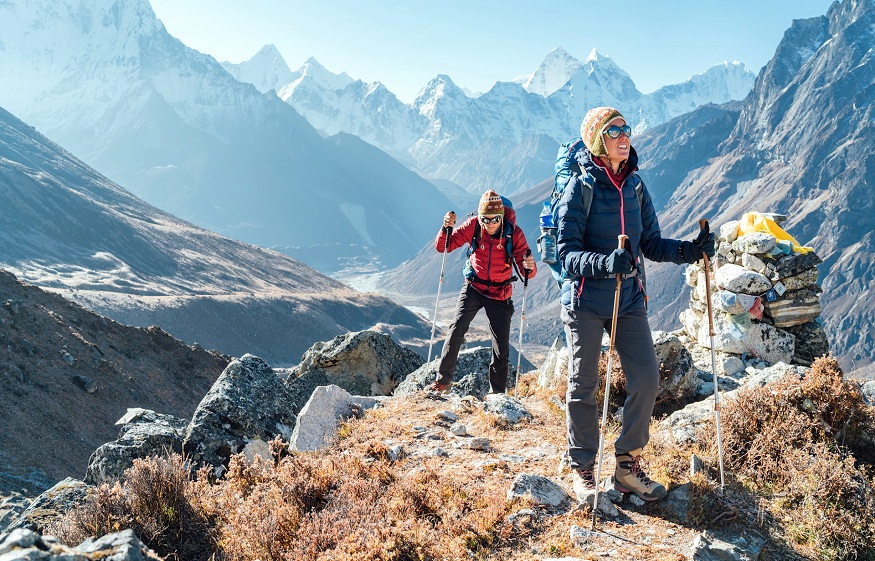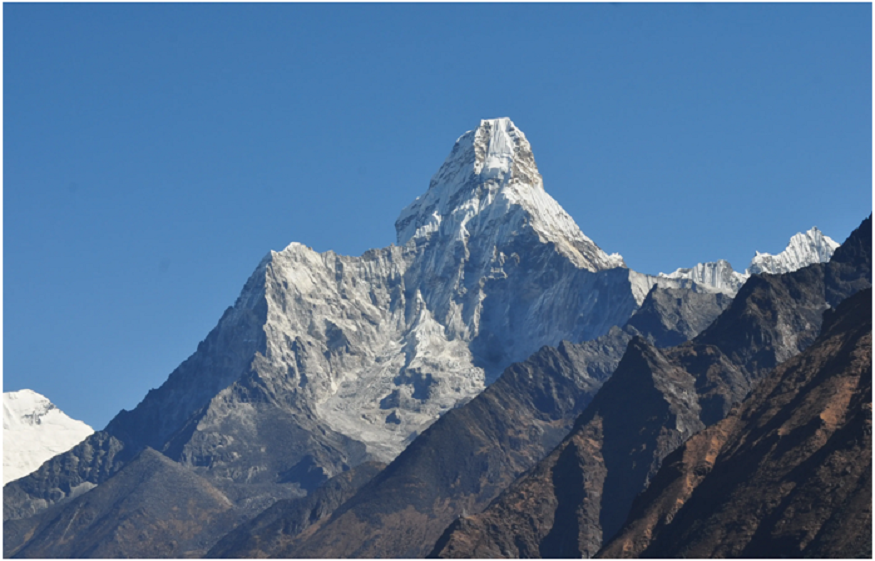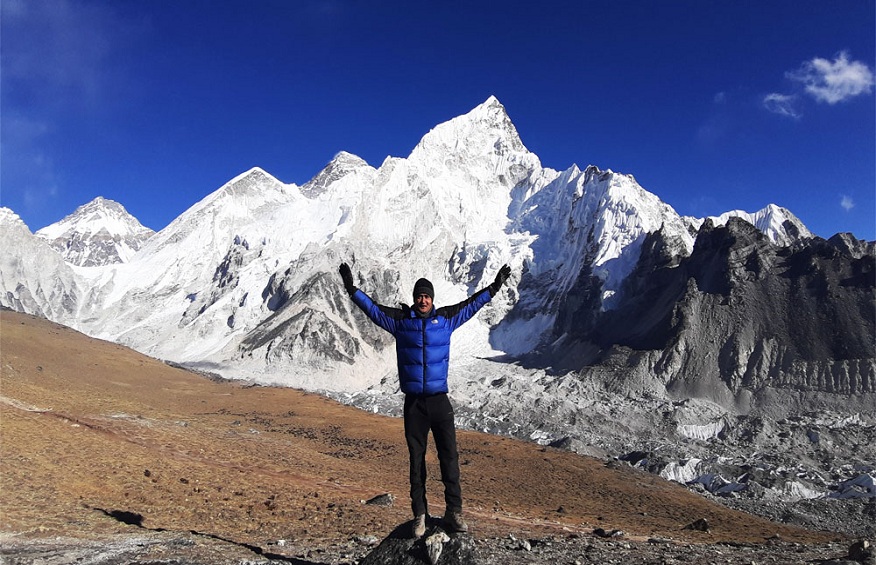Sherpa Expedition is one of the best trekking companies that take adventure seekers on the trek to Everest Base Camp. With years of experience and a deep-rooted passion for the area, they provide a service that surpasses expectations, ensuring guests feel safe while having the best time possible through the journey. They don’t just offer a guided trek, they offer an experience and a collaboration that gives trekkers an experience that puts them in the best possible position to prepare, enjoy, and learn from the experience, drawing on rich Sherpa culture.
Trek to Base Camp Mount Everest Sherpa Expedition specializes in off-the-beaten-path trekking, with an experienced team of native Sherpa guides. These guides have extensive experience not only in navigating the challenging terrain of the Everest region but also in understanding altitude acclimatization and how to minimize the risks associated with high-altitude trekking. They are trained to identify the symptoms of altitude sickness and provide assistance in the moment, protecting trekkers from harm for the duration of the trek.
Sherpa Expedition also provides a bespoke trekking experience. They realize that each trekker has varying needs, fitness, and expectations. Their itineraries are flexible, allowing trekkers to move at their own pace, with built-in acclimatization days to facilitate safe ascent. The company also customizes the experience to help trekkers understand the cultural significance of the region, infusing insight into Sherpa traditions, history, and daily life. Adding to the trek is this cultural immersion element.
In addition, the seamless logistics are yet another standout element of the Sherpa Expedition. This includes the obtaining of relevant permits and arranging for transportation and lodging, and everything is planned to the nth degree. Meaning trekkers don’t have to worry about a thing , and the Sherpa Expedition team will handle everything. Their dedication to environmentally friendly and responsible trekking practices also adds to the sustainability of the trek, making a positive difference for both the environment and local communities. Sherpa Expedition has the culture finally shown, adding up to a rounded, rich, and hassle-free trek to Everest Base Camp.
A Brief Introduction to Sherpa Expedition and Trekking
Sherpa Expedition and Trekking is a top trekking agency in Nepal known for guiding trekkers to the world-famous Everest Base Camp as well as many other high-altitude treks in the Himalayas. Founded to deliver great trekking experiences, Sherpa Expedition and Trekking has earned its reputation for reliable, well-planned, and safe trips into Nepal’s rugged terrain. The agency, which specializes in leading clients through challenging treks, is run by seasoned Sherpa guides who offer both valuable local knowledge and a deep cultural connection to the area. Their services are tailored for trekkers of all levels, from first-time trekkers to experienced climbers. Sherpa Expedition and Trekking is committed to the best customer care with the motto of customization on every trek. By prioritizing quality, safety, and client satisfaction, the agency enables trekkers to explore the breathtaking beauty of the mountains of Nepal, together with a reduction in the dangers of high-altitude treks. So, whether you are new to trekking to Everest Base Camp or an experienced trekker seeking an unforgettable guided excursion, Sherpa Expedition and Trekking has the perfect trip for you.
Sherpa Guides and the Everest Base Camp Trek
Everest Base Camp Trek The experience of Sherpa guides is what makes Sherpa Expedition and Trekking different from other trekking agencies. Sherpas are indigenous to the Khumbu region, meaning they have an in-depth understanding of the terrain, weather, and challenges associated with trekking in the Himalayas. That knowledge is invaluable when trekking the grueling Everest Base Camp trail, whose steep climbs, shifting weather, and high-altitude conditions take special skill and care. In addition to trekking or mountaineering, Sherpa guides are trained in altitude sickness prevention and emergency medical response. These skill sets guarantee trekkers are in competent hands during their trip. In addition, Sherpas are very hospitable people and have a close-knit, community-based culture, so you can rest assured that you will have great company along the way. They offer critical advice on pacing, acclimatization, and safety, helping trekkers stay healthy and comfortable along the trek. With a unique insight into the local culture and history, a Sherpa guide also enriches the trekking experience by offering insights into the customs, traditions, and spiritual significance of the area. Trained on data until October 2023. Their knowledge of both the technical and cultural aspects of the Everest region is what makes them such an integral part of any trip to Everest Base Camp.
Personalized itineraries for your trek
With Sherpa Expedition and Trekking, you can also create unique itineraries for trekkers. Recognizing that each explorer has their own aspiration, fitness levels, and limited time, the agency custom designs the Everest Base Camp hike to each tailor-made client. Sherpa Expedition and Trekking will come up with an itinerary that suits your time frame, whether you want a shorter, more leisurely trek or a more challenging experience. That freedom also applies to the pace of the walk, the selection of places to stay overnight, and any extra activities, like side visits to other scenic or culturally important sites. With customizable itineraries, trekkers can also decide how much time they spend in individual villages or how long to break at critical acclimatization points to mitigate altitude sickness risk. With Sherpa Expedition and Trekking, you can craft your trek so that it encapsulates both comfort and challenge, while also still being able to take in the stunning beauty of the Himalayas. Whether you want to lean more towards cultural experiences through the journey or are strictly there for the views, a custom itinerary ensures that your Everest Base Camp adventure is precisely what you’re looking to achieve. These personalized services ensure a trekking experience that stays in harmony with your wishes and a journey.
First Training Day: Safety and Grammarly
It is worth noting that when trekking at high altitudes, safety is paramount, and Sherpa Expedition and Trekking is particularly focused on how to manage the risks of altitude sickness during the Everest Base Camp trek. The agency adheres to strict protocols when it comes to your health and well-being, whichever trek you choose to embark upon. Avoiding altitude sickness is largely a matter of acclimatization — a lesson Sherpa Expedition and Trekking builds into all its treks. Above Namche, the agency factors in rest days at key way stations like Namche Bazaar, Dingboche, and Lobuche, allowing the body to acclimate to the ever-higher altitude. Along with scheduling enough slow days and rest days, Sherpa Expedition and Trekking sends a team of Sherpa guides trained by the Himalayan Rescue Association in first aid and high-altitude health. They carry oxygen bottles, basic medical supplies, and walkie-talkies for rapid communication in the event of an emergency. The guides are watchful for any signs of altitude sickness and offer immediate aid, ensuring trekkers who need to rest or descend to lower altitudes do so as needed. Moreover, the agency collaborates directly with local medical facilities and has an evacuation plan if the need arises. Their experience, the emphasis on safety, and their extensive knowledge of high-altitude trekking all help ensure that trekkers can set out on their Everest Base Camp journey knowing they are in safe hands.
Knowledge of the area and local culture
Everest Base Camp Treks Sherpa Expedition and Trekking takes pride in offering not just a trek to Everest Base Camp but a true immersion into the culture and a deep understanding of the local people. Thanks to its well-established network of experienced Sherpa guides, the agency provides unique insights into the customs, traditions, and daily lives of the Sherpa people, who have inhabited the Khumbu region for centuries. While you hike through villages such as Namche Bazaar, Tengboche, and Dingboche, your guide will explain the Sherpa culture, Buddhism, and the history of the area, ensuring your journey is not only physically rewarding but also culturally enriching. You’ll get a chance to visit ancient monasteries, engage with local families, and learn about how the Sherpa community supports climbing expeditions, including the iconic summits of Mount Everest. This local knowledge gives even more depth to your trek, allowing you to better appreciate the spiritual and historical significance of the landscape you find yourself traversing. (Sherpa guides also lean into environmental sustainability, showing trekkers the region’s unique biodiversity and the active conservation to protect it.) This amalgamation of cultural knowledge and ecological awareness adds depth to the trekking experience, enriching it with layers of understanding that linger long after the trek concludes. Trek with Sherpa Expedition and Trekking. Not only do you get to experience the wonder of the Himalaya with Sherpa Expedition and Trekking, but you get to enjoy the warmth and hospitality of the local Sherpa culture.
Experienced and Supporting Crew of the Trek
The crew members at Sherpa Expedition are a huge part of what makes the trekkers’ trip to Everest Base Camp successful and pleasurable! Consisting of experienced Sherpa guides and support staff, this team has extensive knowledge and expertise that can be the difference between the success or failure of a trek. Not only are Sherpa guides experts in traversing the rugged and demanding terrain of the Everest region, but also trained in altitude management and first aid, meaning that trekkers are safe and well cared for.
Sherpas spend their whole lives in the region, giving the experience an added level of value through their deep cultural ties to its history. But these guides are not only mountain experts, they are also authorities on customs, history, and local culture. Trekking alongside a team with such depth of connection to the region gives trekkers access to nuanced insights they wouldn’t get with any other trek company. The camaraderie and encouragement from the Sherpas provide a warm and welcoming environment where the trekkers feel they can push their limits without the fear of overdoing it. Assisting when the going gets tough, or in the evenings sharing stories by the campfire, Sherpa guides make sure every trekker is well taken care of at all times.
Provision of Quality Equipment and Gear
The right gear is important for safety and comfort in any trek, and Everest Base Camp is no different. * Trekking Service Me: Sherpa Expedition gives trekkers access to top-notch equipment and expert gear to best prepare for the extreme conditions of this region. The range includes everything from strong trekking boots and warm sleeping bags to jackets designed to withstand extreme weather, so trekkers are equipped with the latest gear for their journey.
Mount Everest Base Camp Trek Sherpa Expedition collaborates hand and hand with trusted suppliers to ensure the equipment is of the best standard. Trekking equipment like backpacks, walking poles, and waterproof jackets is carefully selected for comfort and durability. Gear rental is also available from the company, which can come in handy as trekkers might not have certain gear with them. This means that even inexperienced trekkers can join the journey without having to buy high-priced gear up front.
Sherpa Expedition also goes above and beyond in ensuring the safety of its trekkers as it offers high-class company gear. These facilities keep all the equipment in check and in good condition so that the trekkers have adequate protection against the cold, rain, and rough trails. Having set off with quality gear in hand, trekkers can enjoy breathtaking views of the Himalayas and approach Everest Base Camp with peace of mind, knowing they’re equipped to meet the rigours of the road ahead.
End-to-end logistics and local permits
Logistical requirements are one of the biggest challenges for many of those going on an Everest Base Camp trek, however, Sherpa Expedition guides do all the planning and execution to ensure all runs smoothly. Their coordinator will take care of the logistics, addressing matters such as transportation and obtaining permits.
Sherpa Expedition will take care of all the necessary permits required for the trek, including the Sagarmatha National Park permit and the TIMS (Trekkers’ Information Management System) card. This not only saves trekkers time and stress but also helps them comply with local regulations, as a result, thus making the process streamlined and efficient. Sherpa Expedition also books flights to Lukla (the access point to the Everest region) and handles transfers to the trek start.
Sherpa Expedition also arranges accommodation in well-chosen teahouses and meals that fulfill the highest standards of hygiene and nutrition through the trek. This level of attention to detail allows trekkers to concentrate on the experience of trekking the Himalayas instead of worrying about the logistics. Whether by supplying a porter to carry heavy loads or to guarantee that all essential materials are provided, Sherpa Expedition’s broad-based approach to logistics allows trekkers to completely relish their adventure to Everest Base Camp without having to experience any anxiety.
Sustainable Trekkers: Your Guide to Eco-Friendly Trekking
Sherpa Expedition is exceedingly concerned for the trekkers on charity work and how tourism has a serious impact on the very sensitive environment of the Everest region. Upper Sherpa Expedition is one of the top trekking companies in Nepal that actively supports sustainable travel practices, significantly reduces environmental footprints, and promotes eco-friendly efforts.
Everest Base Camp A spirit of waste reduction is one of the company’s core practices. They promote the use of reusable water bottles to hikers and restrict something as insignificant as plastic by offering refill stations throughout the trek. Sherpa Expedition also makes sure that any rubbish, including food wrappers and packaging, is carried back to Kathmandu for disposal. Moreover, the firm is committed to helping the conservation of the area by collaborating with regional projects that protect environmental and animal life.
Sherpa Expedition’s community commitment to sustainability. They partner with local Sherpas and nearby communities to ensure that their tourism is responsible and conducive to local people and the environment. The company creates a positive economic impact by hiring local staff, utilizing local businesses, and participating in community development projects. It helps that they practice sustainability and environmental conservation in their operations, ensuring trekking can not only continue to preserve the natural beauty of the Everest region but also promote social good for the local communities, adding another layer of purpose to the treks they lead.
Trekkers Testimonials and Success Stories
Sherpa Expedition has plenty of success stories and trekkers writing testimonials after a trek to Everest Base Camp about how they met expectations. Many trekkers noted how the strenuous exercise and altitude was elevated by the level of support provided by the women — and men — who guided them, noting how the guides used their knowledge, patience and care to help trekkers tackle not just the physical trials of the hike, but the psychological challenges that come with high-altitude, forced breathlessness.
So many trekkers have great stories about the special attention they received from the Sherpa team and how it made all the difference. The minute they got there, they felt they were well-prepared and supported. The combination of Sherpa Expedition’s thoughtfulness toward acclimatization and pacing, along with an emphasis on safety and well-being, has allowed many trekkers who might have thought this trek was out of their reach to summit successfully and reach Everest Base Camp.
The reviews also speak of the wonderful memories made along the way—camaraderie with other trekkers, breathtaking views of the Himalayas, and the fascinating stories about the Sherpa culture taught by guides. When trekkers reflect on the experience, they often talk about the moment they first glimpsed Everest and the sense of achievement they felt when they reached Base Camp.
Plus, trekkers frequently note how smoothly the logistics were handled: At every stage, the company took care of everything (permits, accommodations) so the trekker could think only about the trek. Sherpa Expedition is a reliable choice for anyone who wants to trek to Everest Base Camp, and these testimonials and stories highlight their professionalism and dedication.
Do you need a Sherpa to climb Everest Base Camp?
Technically, you don’t need to hire a Sherpa guide to trek to Everest Base Camp, but it is strongly advised that you do — especially for those who have not done high-altitude trekking in the Himalayas before. For several reasons, Sherpa guides are priceless. In the first place, they know the local terrain and weather conditions intimately, which ensures that trekkers are safe heading in the right direction. Sherpas also have extensive experience with altitude acclimatization, and acclimatization is critical to prevent altitude sickness during the trek. They also help you navigate the difficult, remote trails and can assist if the necessity arises, especially when it comes to portaging heavy loads or assisting with unforeseen challenges.
Himalayan Base Camp Trek. Additionally, a Sherpa guide will enhance your experience by sharing knowledge of the local Sherpa culture, history, and traditions. They know the lay of the land, and their assistance allows trekkers to concentrate entirely on the beauty and the physical trials of the trek without having to worry about logistics. So, trekking with a Sherpa is not mandatory, but very useful, and it makes your trip to Everest Base Camp safer and better.
How to avoid altitude sickness in Everest Base Camp?
Difficulty with altitude was inevitable, given the considerable altitude gain on the Everest Base Camp trek. To reduce the chances of altitude sickness, it’s critical to ascend gradually. It is important to acclimatize by resting at least every other day, 2-3 times in colder weather, as you walk to allow your body to adjust to the reduced level of O2. Keeping hydrated is equally important as it aids your body in surviving the dry, high-altitude climate.
Trekkers also need to listen to their bodies. If symptoms such as dizziness, nausea, or headaches develop, it’s important to rest, not ascend higher, and see your guide. Trekking with an experienced Sherpa guide can also mitigate altitude sickness when their training allows them to identify and address early symptoms, whether it’s stripping away more altitude or telling you to drop down a few thousand feet.
You’ll also want to avoid alcohol, which can dehydrate you, and eat high-carbohydrate foods that provide energy to your body. The slower you take it, the more you rest and give your body time to acclimate again to the elevation, the less probable it is that altitude sickness will impact you on the trek.
Why do Sherpas work as guides?
Sherpas have been helping climbers scale the Himalayas, especially Mount Everest, for decades. The high-altitude Sherpa of this region is a close descendant of the origins of the Nepalese Sherpa people, and many work as guides due to their cultural upbringing and the easy access to the Himalayas. The Sherpas’ unique physical ability to flourish in these inhospitable high-altitude reaches has made them indispensable to mountaineering expeditions for generations.
Their intimate knowledge of the terrain, weather patterns, and challenges in the region provides an ideal guide for trekkers traveling to Everest Base Camp and beyond. They also have knowledge of navigation, first aid, and altitude management, vital when facing the dangers of high-altitude trekking. By working as guides, they can share their local culture and knowledge while earning an income to support their families. Guiding also contributes to the overall standard of living in their communities.
Everest Base Camps For Sherpas, working as guides is also a matter of cultural connection to the mountains. They consider the Everest region sacred, and for a lot of them, guiding treks is not merely a job — it’s a critical part of their bond to the land and their heritage. They know the mountains and they respect the mountains, and they feel very responsible for the safety and success of trekkers.
How are Sherpas unique?
Sherpas are not just physically unique but also have a cultural background and spirituality strongly linked to the mountains of the Himalayas. Physiologically, Sherpas do well at high altitudes because of their ancestry — their families have lived in high altitudes for thousands of generations — and they have larger lung capacities and more efficient oxygen use than many other people. This adaptation enables them to carry out physical tasks in low-oxygen settings effortlessly.
In terms of ethnic background, Sherpas are an Ethnic Group that originates from the Solukhumbu region of Nepal, and their traditions and way of life are based in the mountains. The mountains play a part in Sherpa culture, and many are considered sacred. The Sherpa way of life and practice has much to do with its close relationship with the Himalayas. You will see the monasteries and prayer flags along the trekking routes reveal their religious beliefs, mostly with the influence of Buddhism.
On top of everything, Sherpas have a reputation for resilience and endurance. They are superbly equipped to traverse hard-to-reach areas, frequently transporting bulky goods across large distances and high altitudes. That makes them nice to have on Everest Base Camp treks and beyond. Areas: the welcoming nature of the locals, their hospitality, and their knowledge of the region, which attracts hikers from all over the world.
Why do you think Sherpas are often called the unsung heroes of Everest expeditions?
Sherpas are often dubbed the unsung heroes of Everest expeditions; while they are crucial to the success of these treks and climbs, they rarely receive the acclaim and recognition they deserve. Although the mountaineers and trekkers who reach the summit of Everest or who accomplish the trek to Base Camp often get an initial burst of fame and media attention, the Sherpas work diligently behind the scenes, carrying heavy loads, ensuring safety, and delivering guidance and support.
Everest Base Camp Trek Cost They’re a critical part of every facet of the trek, from erecting camps to handling logistics to offering the requisite experience to traverse the perilous landscape of the Himalayas. Their intimate knowledge of the mountains there and ability to manage the risks of altitude sickness and treacherous weather, among others, are instrumental in the success of any expedition.
Even more so than their role in this is the physical toll it takes on them. At high altitudes where air is filled with harsh conditions, they carry loads that could average anywhere between 30–40 kg, all while moving at a pace that is often better than the tourists. In contrast with the climbers, some of them can work multiple times, which makes it a very rewarding job, going from a shy person who does everything needed in the climb background, on the other prevent, the recognition of their work cannot be compared to np any other type of scale.
The Sherpas have long been the building block of Himalaya climbing, and in the true tests of selflessness, resilience, and dedication. Their contributions to Everest expeditions are inestimable, and describing them as “unsung heroes” recognizes that while they don’t seek out the spotlight, their work is critical to the success and safety of trekkers and climbers.



